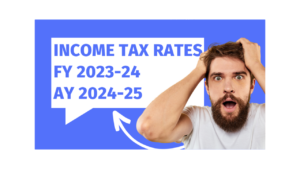Why is a income tax audit conducted?
The main objective of the tax audit is to ensure the correctness of the books of accounts of an organisation. A qualified chartered accountant checks the financial records from time to time to make sure they comply with the accounting standards, establishing truthfulness and trust. It is also a step in finding any discrepancies on time to take corrective action.
It also provides the Income Tax Department with proper records that are vital to ensure fair business practices in the country.
Assesses can check the applicability of a tax audit by evaluating various guidelines. It can be in terms of the total sales, turnover, or even the gross profit earned in a financial year. Let us look at how different taxpayers are categorised.
Tax audit applicability
Tax audits are applicable in the cases of businesses and professions as described below:
| Assessee | When is tax audit necessary? |
| Assessee who is carrying on a business but has not opted for the presumptive taxation scheme. | If the turnover, gross receipts, or sales exceed Rs. 1 cr. w.e.f. FY 2020-21, if cash transactions amount up to 5% of total gross receipts and payments, tax audit is necessary when turnover exceeds Rs.10 cr. |
| Assessee who is carrying on a business and is eligible for the presumptive taxation scheme under Sections 44AE, 44BB, or 44BBB. | If they claim profits lower than the limit as prescribed under the presumptive taxation scheme. |
| Assessee who is carrying on a business and, under Section 44AD, is eligible for the presumptive taxation scheme. | If they claim profits lower than the limit as prescribed under the presumptive taxation scheme and have a total income exceeding the basic exemption limit under the Act. It is also necessary if the sales, gross receipts, or turnover is greater than Rs. 2 cr. |
| Assessee who carries on a business but is not eligible to claim presumptive taxation under Section 44AD because of opting out of it in any 1 year during the 5 year lock-in period starting from the year in which the scheme was opted for. | If income exceeds the maximum limit in the subsequent 5 years from the financial year, the scheme was not opted for. |
| Assessee who is carrying on a profession but has not opted for the presumptive income scheme. | If total gross receipts are in excess of Rs. 50 lakh. |
| Assessee who is carrying on a profession and has opted for the presumptive taxation scheme under Section 44AD. | If profits are lower than the limit as prescribed under the presumptive taxation scheme. If total income exceeds the amount not chargeable to tax. |
| Assessee who has incurred a loss from carrying on the business and has not opted for presumptive taxation scheme and their income is more than the basic limit as prescribed. | If the total sales, gross receipts, or turnover exceeds Rs. 1 cr. |
| Assessee who is carrying on a business and has opted for the presumptive taxation scheme, has a business loss but with income exceeding the threshold limit. | If the taxable income is below the limit under the presumptive tax scheme and the income is more than the threshold limit under the Act. If income does not exceed the threshold limit, no tax audit is required. |
What is an audit report?
While filing the income tax return, the chartered accountant assigned to the assessee must furnish an audit report. The report is given under Form 3CA or 3CB. This is applicable as follows:
Form 3CA: When the assessee carries on a profession or any business and gets their accounting records audited under any other Act. This includes the Companies Act, Societies Registration Act, etc.,
Form 3CB: When the assessee carries on a profession or any business but does not need to get his accounting records audited under any other Act. The tax audit here is to satisfy the requirements of the Income Tax Act.
Form 3CD: It is a statement of particulars prescribed under Section 44AB of the Income Tax Act. It must be attached along with the application form.
After completing the tax audit, the chartered accountant is supposed to furnish the report on the online portal using their login details. After the report is uploaded, the taxpayer can either reject or accept it. If it is rejected, the assessee undergoes the audit process again until the report is accepted.
Deadline for furnishing the report
As a taxpayer, you must take note of the final date for filing the audit report. In most cases, the given deadline is 30 September of the next year. However, if you have entered into any transaction internationally, the deadline is extended to 30 November.
Penalty for late submission
In case you fail to get your books audited on or before the deadline, a penalty is applicable. It is taken as the least of the following two options:
– 0.5% of the turnover, total sales, or gross receipts
– Rs. 1.5 lakh
The tribunal or court may waive off the penalty in case of a reasonable cause. This can happen in case:
– There is a natural calamity.
– The tax auditor resigns, which causes a delay.
– There are strikes, lockouts, or any other labour related issue for a long period.
– Death or disability of the partner looking after the accounts.
– Any situation beyond the control of the assessee that leads to the loss of accounts.
Conclusion
As an ethical taxpayer, awareness of the latest provisions of various audit processes is crucial. If you are eligible for undergoing a tax audit, ensure that you do so before the due date. As many amendments and relaxations come into force occasionally, do remember to keep up with the latest announcements by the Government. Consult your CA or tax advisor for professional guidance.









